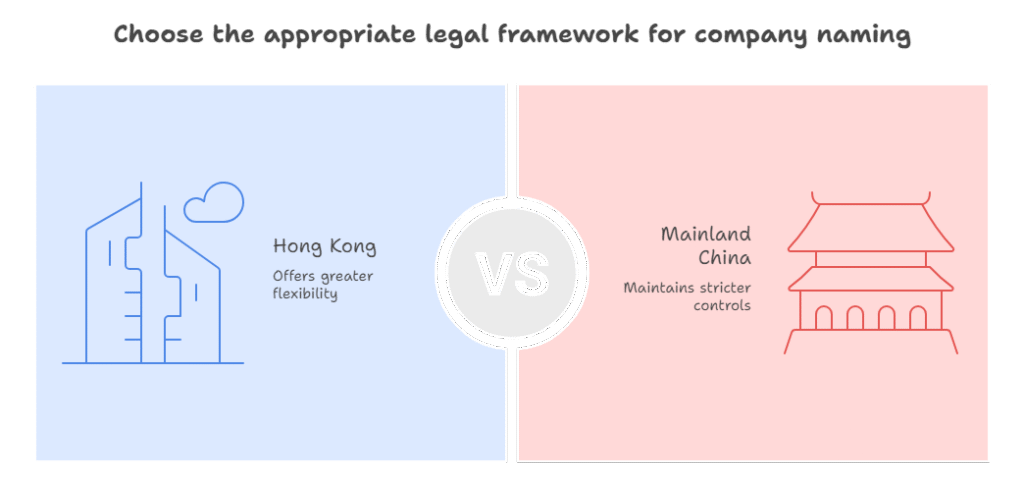When establishing a business presence in China, understanding the distinct naming regulations between Hong Kong and Mainland China is crucial for foreign investors and entrepreneurs. The two regions operate under different legal systems and business environments, leading to significant variations in how companies can be named and registered. This comprehensive guide explores these key differences to help you navigate the complexities of Chinese business naming conventions.

Legal Frameworks Governing Company Names
Hong Kong and Mainland China maintain separate legal systems that dictate company naming rules:
Hong Kong’s System:
- Governed by the Companies Ordinance (Cap. 622)
- Administered by the Companies Registry
- Follows common law traditions inherited from British rule
- Offers greater flexibility in naming conventions
Mainland China’s System:
- Regulated by the Company Law of the People’s Republic of China
- Administered by the State Administration for Market Regulation (SAMR)
- Operates under civil law principles
- Maintains stricter naming controls
These fundamental differences in legal frameworks create variations in what constitutes an acceptable company name in each jurisdiction.
Structural Differences in Company Names
Hong Kong Company Name Structure
Hong Kong company names typically follow this format:
- Optional prefix: Can include descriptors like “International,” “Global,” or “Asia”
- Unique name element: The distinctive part of the name
- Legal ending: Must indicate limited liability status
Example: ABC International Trading Limited
Key characteristics:
- Can be in English, Chinese, or both
- No requirement to include geographic indicators
- Greater creativity allowed in name selection
Mainland China Company Name Structure
Mainland Chinese company names must follow a strict format:
- Administrative division: Province or city name
- Trade name: Unique identifier (2+ Chinese characters)
- Industry description: Must reflect primary business activities
- Organizational form: Must indicate company type
Example: Shanghai XYZ Technology Co., Ltd.
Key characteristics:
- Must include geographic indicator
- Industry description must match actual business
- Strict limitations on vocabulary and expressions
“Limited” vs “有限公司”: Compliance Requirements
The designation of limited liability status shows important differences between the two regions:
In Hong Kong:
- English names must end with “Limited”
- Chinese names must end with “有限公司”
- Both forms carry equal legal weight
- Can use either or both languages in registration
In Mainland China:
- Chinese names must use “有限公司” (for LLCs) or “股份有限公司” (for joint-stock companies)
- English names are optional and don’t have legal standing
- If used, English names should mirror the Chinese structure
Important note: In Mainland China, the Chinese version is the legally binding name, while the English version serves only as a reference. This differs from Hong Kong where both language versions have equal legal status when registered.
Legal Validity of Chinese vs. English Names
The recognition and enforceability of Chinese and English names varies significantly:
Hong Kong:
- Both Chinese and English names have full legal validity
- Either version can be used in contracts and legal documents
- Courts recognize both versions equally
- Changing between languages requires formal registration
Mainland China:
- Only the Chinese name has legal validity
- English names are considered aliases without legal standing
- Contracts should use the Chinese name for enforceability
- Official documents must use the Chinese version
For businesses operating in both regions, it’s essential to understand that while Hong Kong treats both language versions equally, Mainland China only recognizes the Chinese name in legal contexts. This distinction can have significant implications for contract enforcement and dispute resolution.
Restricted and Prohibited Terms
Both regions maintain lists of restricted words, but with different emphases:
Hong Kong Restrictions:
- Words implying government affiliation (e.g., “Municipal,” “Commission”)
- Financial terms requiring licenses (“Bank,” “Insurance”)
- Words suggesting special status (“National,” “Imperial”)
- Generally more permissive with international terms
Mainland China Restrictions:
- Political terms (“China,” “Communist Party”)
- Geographic indicators beyond approved list
- Words suggesting state sponsorship
- Culturally sensitive terms
- Industry-specific terms requiring pre-approval
Mainland China maintains a more extensive list of prohibited terms, particularly those with political or cultural sensitivity. The Enterprise Name Prohibition and Restriction Rules provide detailed guidance on unacceptable names.
Practical Considerations for Foreign Businesses
When choosing between Hong Kong and Mainland China for company registration, consider:
- Branding flexibility: Hong Kong offers more creative freedom
- Legal recognition: Mainland China prioritizes Chinese names
- International appeal: Hong Kong names may resonate better globally
- Administrative requirements: Mainland China has more stringent rules
- Future expansion: Names may need adjustment when crossing borders
For businesses needing to verify Chinese company names or obtain official documentation, professional services like China company verification reports can provide authoritative confirmation of a company’s registered name and legal status.
Conclusion
The differences between Hong Kong and Mainland China company naming rules reflect their distinct legal traditions and administrative approaches. Hong Kong’s system offers greater flexibility and international compatibility, while Mainland China maintains tighter controls to ensure standardization and cultural appropriateness. Understanding these variations is essential for any foreign business establishing a presence in China or dealing with Chinese companies.
When in doubt, consulting with legal professionals or utilizing professional verification services can help navigate these complex regulations and ensure compliance with local requirements.
